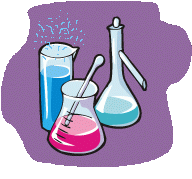


Description of experiment
Below follows a plain text transcript of the selected experiment.
![]()
Needed compounds:
-----------------
sodium hydroxide : NaOH
sodium borohydride : NaBH4
nickel sulfate : NiSO4 . 6H2O
Class:
------
elem=H,B,Ni
redox
Summary:
--------
Nickel(II) ion is reduced in slightly alkaline environment by borohydride ion,
but only with difficulty, when the mix is heated.
Description:
------------
Dissolve some nickel sulfate in water: A clear green solution is obtained.
Dissolve some sodium borohydride in water and also add a few granules of sodium
hydroxide to keep the solution somewhat alkaline: A clear solution is obtained.
No hydrogen is evolved.
Mix the two solutions: A pale green flocculent precipitate is formed. This
precipitate most likely is nickel hydroxide, possibly contaminated with
borohydride and borate.
Heat the liquid with the green precipitate: At first glance, nothing seems to
happen. The liquid remains turbid and pale green. However, at a certain point,
well before the liquid starts boiling, hydrogen gas is produced. When heating
is stopped, the production of hydrogen gas continues. While this gas is
produced, the liquid also changes color. Slowly, the color changes from pale
green to dark grey, almost black. The whole process takes 1 to 2 minutes. After
this period, the production of gas ceases, and it looks as if no nickel(II)
hydroxide is left anymore.
Remark:
--------
It is striking that the production of hydrogen gas and the formation of nickel
metal are happening at the same time and it seems that as soon as the
nickel(II) ions are used up, that formation of hydrogen gas also stops.
![]()